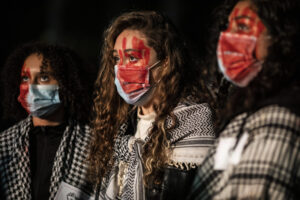Israel is ignoring crime in Palestinian communities

Limor Abu Dieb,15, (C), Malaka Abu Kishil,14 (L) and Heba Abu Shakif,14, painted their faces with red hands to symbolize the bloodshed in their community in a protest held at Tel Aviv’s Rabin Square on 18 March 2021
Deiaa Haj Yahia writes in The Electronic Intifada:
With over 130 murders this year alone, violent crime within Israel’s Palestinian community is reaching new levels and grabbing headlines. But while the murder rate is unprecedented, the crime spree has been a long time in the making.
Much has to be attributed to decades of state policies, specifically over the past 20 years, that have negatively affected various aspects of life for Israel’s Palestinian citizens, whether socioeconomic, their marginalization in political life, or with respect to their own national self-identity. Generations of Palestinian have suffered official discrimination and a shrinking horizon for a better future.
This marginalization – which includes a lack of state funding for various social and educational programs, leaving three times as many Palestinians as Jews in poverty, budget policing in Palestinian areas, and restrictions on expanding living space – goes right back to the founding of the Israeli state during the Nakba 75 years ago. This period includes the nearly 20 years of martial law imposed on the community from 1948-1966.
This has allowed space for violent criminal gangs. The absence of any engaged police presence has led to a loss of a deterrence, and bloody retaliations between families and between criminal organizations have added to the mix, contributing to a general state of insecurity. It is from here that 2023’s 131 murders have come.
The unlicensed weapon
Many Palestinian community leaders and politicians date the emergence of the spike in violence and crime to the onset of the second intifada in 2000, during which 13 young Palestinian citizens were killed in clashes with police over then Israeli opposition leader Ariel Sharon’s visit to al-Aqsa mosque in occupied East Jerusalem. An Israeli investigation subsequently found that police had used excessive force.
It became clear that the Israeli government – harking back to the first 20 years of Israel’s existence, when Palestinian citizens lived under martial law – still considered the Palestinian community a national threat. There were several statements from top Israeli security and intelligence officials to this effect, including from the then head of Israel’s domestic intelligence agency, the Shin Bet, Avi Dichter: “You will pay a high price for the protests. What about you? What about the West Bank and al-Aqsa? There will come a time when you will be left to your own devices.”
This alienation from the state – what the legal rights group Adalah describes as the treatment of Palestinian citizens as “enemy aliens” – is still at play today.
